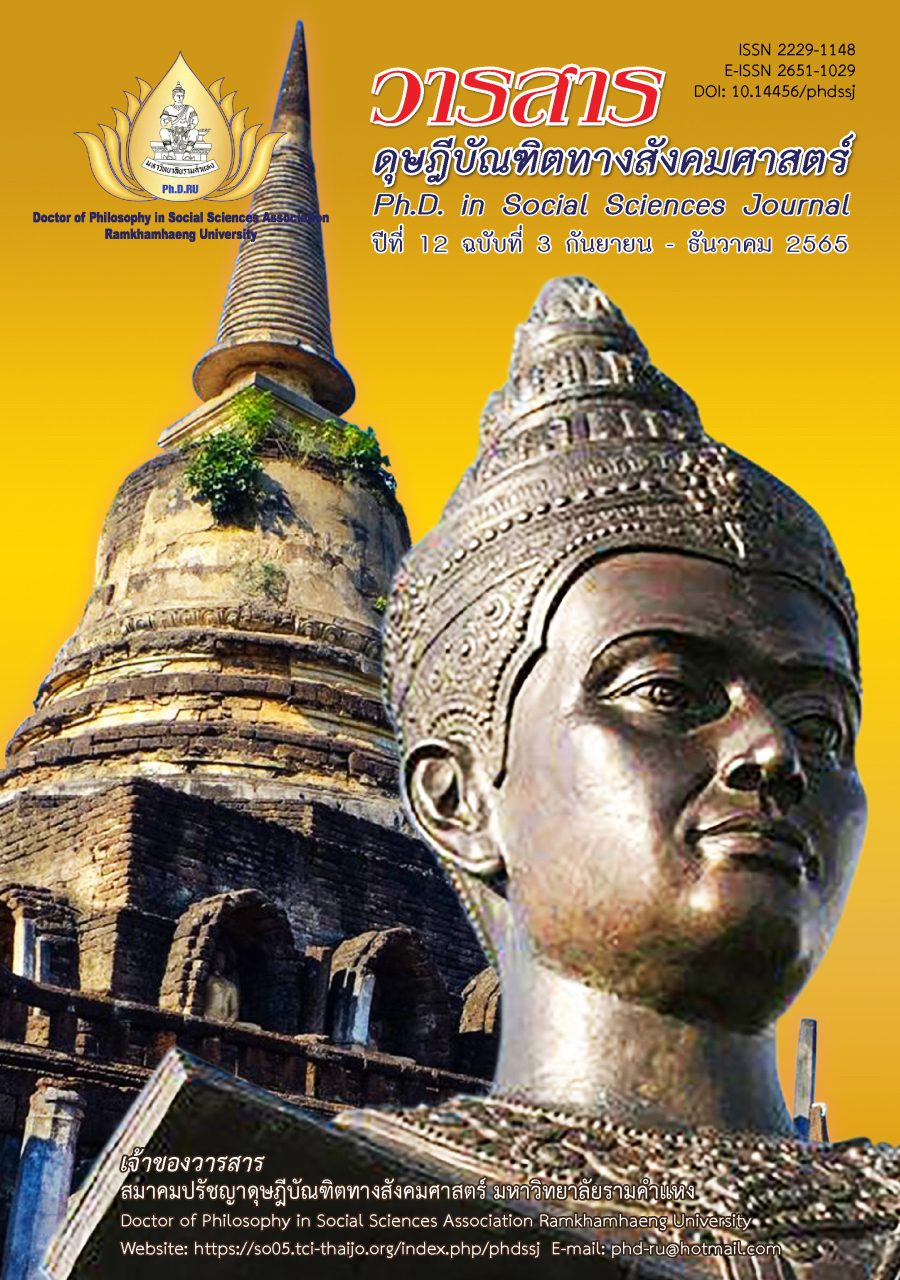Developing Self-Awareness of Students
Main Article Content
Abstract
This academic article aims to propose the definition, meaning, and theoretical concepts of self-awareness, factors affecting self-awareness, elements of self-awareness, and guidelines for developing self-awareness to propose a concept for developing self-awareness in students. Related studies and theories of the concepts were analyzed and synthesized.
The analysis has found that self-awareness is the ability to know and understand yourself and comprehend your thoughts, emotions, and actions as well as your strengths and weaknesses leading to the development of potential in various fields. The main theoretical concepts are Self-Theory, Gestalt Theory of Personality, Transactional Analysis, and The Johari Window. Both internal and external factors affect self-awareness. Self-awareness has 4 components: values, thought patterns, adaptation, and interpersonal relations, and there are three concepts for the development of self-awareness: self-study by self, self-study by listening to the opinions of others, and self-exploration using assessments and surveys.
Article Details

This work is licensed under a Creative Commons Attribution-NonCommercial-NoDerivatives 4.0 International License.
Academic articles, research articles, and book reviews in the Ph.D. in Social Sciences Journal are author’s opinions, and not the publisher’s, and is not the responsibility of the Ph.D. in Social Sciences Journal Philosophy Association, Ramkhamhaeng University. (In the case that research is done on human, the researcher has to be trained in Ethics for Doing Research on Human Training and has to produce the evidence of the training).
References
Ackerman, C. E. (2019). My pocket gratitude: Anytime exercises for awareness, appreciation, and joy. Adams Media.
Bar-On, R. (2006). The Bar-On model of Emotional-Social Intelligence (ESI). Psicothema, 18(Supplement), 13-25.
Berne, E. (1958). Transactional analysis: A new and effective method of group therapy. American Journal of Psychotherapy, 12(4), 735-743.
Boonya-Hotara, P. (1999). Personality and adjustment. Kamphaeng Phet Rajabhat Institute, Faculty of Education. [In Thai]
Boonyaprapun, B. (2020). Development of manual for self-awareness of undergraduate students. The Journal of Faculty of Applied Arts, 13(1), 74-85. [In Thai]
Boonyasopon, Y., & Pinthapataya, S. (2007). Industrial quality psychology. King Mongkut’s University of Technology North Bangkok. [In Thai]
Bradberry, T., & Greaves, J. (2006). The emotional intelligence quick book: Everything you need to know to put your EQ to work. Simon & Schuster.
Cameron, K. S., & Whetten, D. A. (Eds.). (1983). Organizational effectiveness: A comparison of multiple models. Academic Press.
Chaijukul, Y. (2000). Emotional intelligence development. In A. Sukharom, W. Chuawanlee, & O. Choochom (Eds.), Assemble journal of E. Q. (pp.192-195). Desktop. [In Thai]
Chaiyapan, M. (2019). Human behavioral development. Chulalongkorn University Press. [In Thai]
Chongruksa, D. (2011). Theories of counseling and psychology (5th ed.). Technology Promotion Association (Thailand-Japan). [In Thai]
Chuawanlee, W. (1999). The development of emotional intelligence to career success. Journal of Behavioral Science, 5(1), 37-52. [In Thai]
Department of Mental Health, Bureau of Mental Health Academic Affairs. (2006). Empathic to others. Office of Printing Affairs, War Veterans Organization. [In Thai]
Duval, S., & Wicklund, R. A. (1972). A theory of objective self-awareness. Academic Press.
Jurod, R. S. (2021). Learning management and important skill on 21st Century. Wishing Journal Review, 1(1), 25-36. [In Thai]
Loywirat, T., Kaewnoo, K., & Kongchan, K. (2015). A study of the causes and factors affecting the undergraduate students dropped out from the university Prince of Songkla university. Research Report, Prince of Songkla University. [In Thai]
Luft, J., & Ingham, H. (1955). The Johari window, a graphic model of interpersonal awareness. Proceedings of the western training laboratory in group development. University of California, Los Angeles.
Nongnuch, N. (2009). The effects of guidance activities for enhancing self-understanding of the Matthayomsuksa 3 students. Master thesis of Education (Guidance and Counseling Psychology), Srinakharinwirot University. [In Thai]
Noosomton, W., Suanphiroth, S., & Puti, S. (2012). The effects of integrated teaching self- awareness activities & guidance activities enhancing self-understanding towards students. Research Report, Prince of Songkla University, Pattani Campus. [In Thai]
Rogers, C. R. (1959). A theory of therapy, personality, and interpersonal relationships: As developed in the client-centered framework. McGraw-Hill.
Vihoktoe, P. (2003). Self-understanding. In Life skill, unit 6. Sukhothai Thammathirat Open University, Office of the University Press. [In Thai]
Yaemnimnual, T., Chayvimol, R., & Koolnaphadol, P. (2012). The effects of gestalt group counseling on adversity quotient of vocational certificate level students in Department of Industry. The Journal of Faculty of Nursing Burapha University, 20(1), 12-21. [In Thai]


